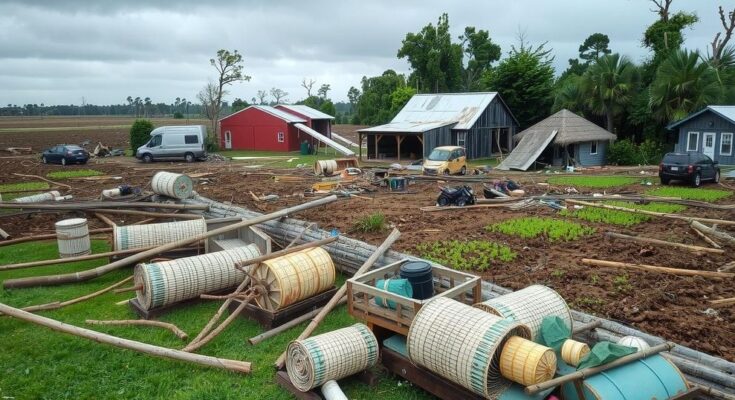Farmers in Georgia are still recovering from the devastation caused by Hurricane Helene, which made landfall as a Category 4 storm in September 2023. The hurricane has led to an estimated $10 billion in agricultural losses across the South, with Georgia suffering $5.5 billion alone. Farmers face dire financial challenges as their crops, particularly cotton and pecans, were severely impacted. As recovery efforts begin, timely state and federal assistance becomes essential for the industry’s sustainability.
In Lyons, Georgia, Chris Hopkins continues to grapple with the aftermath of Hurricane Helene, which devastated his farm over two months ago. The storm made landfall as a Category 4 hurricane on September 26, wreaking havoc across the South, devastating crops, uprooting timber, and damaging infrastructure. Hopkins, among many farmers, faces emotional and financial turmoil, questioning whether to rebuild or walk away from farming. Experts estimate the total agricultural losses from Florida to Virginia exceed $10 billion, indicating how widespread and severe the impact of Helene has been.
The destruction in Georgia alone resulted in estimated losses of $5.5 billion, and North Carolina faced $3.1 billion in damages. The storm particularly affected cotton businesses during a crucial harvest period, with farmers like Hopkins reporting losses of 50% of their cotton. Despite having insurance, he anticipates a significant shortfall in recovering his losses, which are estimated at $430,000 just for cotton. General losses also include extensive damages to pecan orchards and poultry production facilities, complicating recovery further.
Hurricane Helene not only caused immediate damage but also long-term repercussions for the agricultural industry. For example, Jeffrey Pridgen, a fifth-generation poultry farmer, expresses the looming threat to his business sustainability as he faces substantial reconstruction costs after losing four of his chicken houses. Furthermore, while some sectors, like pecans, may see price fluctuations due to diminished supply, experts suggest that the overall consumer market impact will be minimal given agriculture’s resilience and other crops’ ability to fill gaps.
As farmers continue to assess the damage, the state of Georgia has attempted to provide assistance, redirecting funds for emergency loans while awaiting federal disaster aid. However, restrictions on state funding for direct aid to individuals pose challenges in providing timely support. Farmers and agricultural experts alike stress the urgency of financial assistance to prevent long-term declines in productivity and employment.
In summary, Hurricane Helene has triggered a profound crisis for farmers across the affected Southern states, whose recovery will depend on timely aid and the collective resilience of an industry already facing challenges before the storm. As they rebuild, farmers contend with heavy losses emotional and financial, underscoring the critical need for immediate and effective support from both state and federal governments.
The article discusses the extensive impact of Hurricane Helene, which struck the southern United States in late September 2023, focusing on the challenges faced by farmers in Georgia and neighboring states. It highlights the storm’s classification as a major Category 4 hurricane, which led to widespread destruction affecting crops, farm equipment, and essential infrastructure. Experts estimate over $10 billion in losses throughout the agricultural sector in the affected regions, revealing the scale of the economic impact and the urgency for recovery efforts amidst ongoing struggles from previous weather challenges. The narrative includes personal accounts from farmers detailing their emotional and financial turmoil, illustrating the broader implications for the agricultural industry and local economies.
The devastation wrought by Hurricane Helene has left farmers in the southern United States grappling with unprecedented challenges. With estimated losses exceeding $10 billion, the response from state and federal authorities is crucial for providing support during this recovery phase. As farmers like Chris Hopkins and Jeffrey Pridgen navigate financial liabilities and operational setbacks, it is imperative that aid arrives swiftly to mitigate further damage to the agricultural landscape of this vital region. The long-term sustainability of farms and the livelihoods of rural families now hinge on collective resilience and timely assistance.
Original Source: www.agrinews-pubs.com




